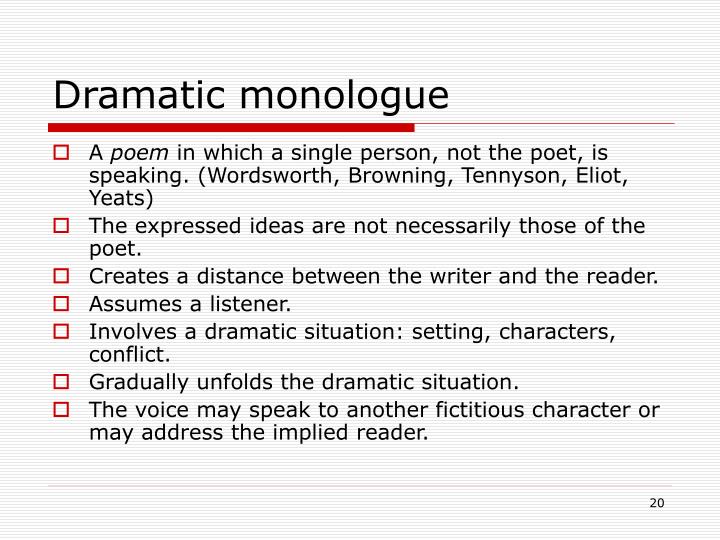

Thus even before the advent of the Unreliable Narrator in Modern fiction, these Dramatic-monologue personae functioned in poems in the same manner I explained in a previous video in this series about that other narrational mode. Since the novel was the most popular form of literature during that era, the Dramatic Monologue appears to have appealed to Victorian audience’s fascination with fictional characters.ĭuring this period as well, one poet in particular, Robert Browning, single-handedly changed the Dramatic monologue by introducing personae whom were so troubled, delusional, or egotistical that, as they explain themselves to their audience, they indirectly reveal their misperceptions and failings-which they never appear to grasp themselves. In 19th century England, the Dramatic Monologue form became a staple kind of poem for the generation of English people referred to as Victorians after their Queen, who ruled for 70 years. In Samuel Taylor Coleridge’s 1798 poem, Rime of the Ancient Mariner, for example, an old sailor stops a wedding guest on his way to the ceremony and explains to him what he has learned about devotion, love, and respect for all living thing-concluding his monologue with the Romantic sentiment that “He prayeth best who loveth best/All things great and small/For the dear God who loveth us/He made and loveth all.” The themes of these poems attempt to teach the reader a lesson about ethics or beauty and are stated directly to this implied audience with an urgent sincerity. In the Romantic Dramatic Monologue, the persona usually has a tale to tell that suggests the struggles and victories of everyday people, often in rural settings, and how they might find solace in human ideals like the peace of nature, spiritual fulfillment, or loving relations between family, friends, or lovers. But in the Dramatic Monologue poem, the voice/persona reveals through observation that he/she is most often speaking to an audience other than the reader-addressing another figure in the poem or even one the speaker imagines needs to hear some pressing matter while not actually present at the moment. In this type of poem, the poet adopts a persona (a voice and character other than his or her own) very much like a playwright puts his or her thoughts into the mouths of characters in a drama.

Poets of the Romantic movement in Europe of the 1780’s and beyond began to write a different kind of Lyric poem called the Dramatic Monologue. Conference for Antiracist Teaching, Language and Assessmentįrom its origins in Hellenic culture all the way through the end of the 18th century, however, the voice of lyric poetry was always assumed to be that of the poet him or herself, offering in elaborate musical rhythms and provocative metaphors his/her own experiences or thoughts directly to an audience of readers or listeners.About Patrick Stone and the Stone Award.2019 Stone Award Winner - Colson Whitehead.2014 Stone Award Recipient - Tobias Wolff.2012 Stone Award Winner - Joyce Carol Oates.

Updating OSU User Web Profile Instructions.Master of Arts in Interdisciplinary Studies (MAIS).Financial Assistance for English Undergraduates.
#DRAMATIC MONOLOGUE PROFESSIONAL#


 0 kommentar(er)
0 kommentar(er)
